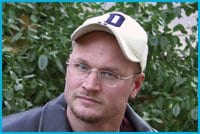“It was brutal to write,” says Augusten Burroughs of A Wolf at the Table, a new memoir about his father. “I hadn’t really planned to write about my father. It was sort of like water under the bridge — that’s gone and I’m never gonna have to think about that again. But then when he died in 2005 I didn’t feel the way I expected. I thought I would feel this wave of grief or sadness or longing or just regret over what we didn’t have. But instead I felt free for the first time.”
Burroughs shot to fame in 2003 with his first memoir, Running with Scissors, which recounts his bizarre adolescence spent living with his mother’s psychiatrist and his eccentric family — a story so strange and unusual that Burroughs has been accused more than once of fabricating it entirely (these claims have not so far held up in court).
His second memoir, Dry, dealt (perhaps not surprisingly, given the content of the first) with his recovery from alcoholism years later in New York. Now, in A Wolf at the Table, Burroughs has returned to his childhood in Massachusetts where he explores his troubled relationship with his alcoholic and, he claims, sociopathic father.
Wolf is a chilling memoir that is markedly different in tone from his other books, which are full of black comedy even in their bleakest moments. But humour would be out of place in this latest installment in Burroughs’ richly unusual life, which is told from a young child’s uncomprehending point of view. The young Burroughs starts out craving his father’s attention, but gradually grows terrified of the shadowy and dangerous presence that stalks his house at night, starves his guinea pig and turns his docile pet dog into a ferocious beast while Burroughs and his mother are away from the house for just a few nights.
Despite the uniqueness of Burroughs’ own father, the book’s themes are universal, like his longing throughout his life for his father’s always elusive love and approval.
“So many people had a horrible father,” says Burroughs, “or sometimes a horrible mother. I used to think it was weird when I would go to the bookstore and look for books about fathers and sons and the difficult relationships, I would never find them. I would find these Norman Rockwellian advice books.”
Burroughs’ father, he says, was so uninterested in his life and career that he didn’t read any of his books.
“He saw the success of them and I signed copies for him to give to his coworkers and his coworkers’ children, but he never read a word I wrote. I would have written Wolf during his lifetime, it’s not that I saved it until after he was dead… he wouldn’t have read it but if he had been forced to read it he would have had absolutely no reaction at all.”
His father’s eerie lack of emotional responses convinced Burroughs in the end that his father was a sociopath. “My grandmother said about my father, ‘There always was something different about him, something was wrong with him even as a little boy.’ It doesn’t sound like much when I say it but coming from her it was a revelation. For her to admit that her precious first-born southern son, that something was wrong with him even as a little boy, it was a revelation.”
Burroughs’ three full-length memoirs contain so much oddness and so much horror that it’s easy to forget that none of it is fiction, and that all of this happened to one man. “I have a lot of holes,” he says. “That sense of safety in the world, that sort of hammock under the heart — I don’t have it.”
But the experiences that make his books so fascinating have also left him, he says, with a powerful survival instinct. “I know that I’m the kind of person that if we were in a plane and the pilots died I could land the plane, I know I could land the plane. I’m 100 percent positive I could land the plane, having never flown a plane, and I’m 100 percent positive that no one would be hurt in my landing. And that’s because of my childhood.”
Burroughs says Wolf took him two years to write, but he’s already thinking about his next few projects, which include a collection of “horrible funny holiday stories” called You Better Not Cry. “I’ve always loved Christmas, it’s always been my favourite holiday, and every single one has been a nightmare,” he says.
Burroughs won’t reveal the subject of the second book he’s working on, although he does say that it’s a novel — his first since Sellevision, which was published before Running with Scissors. He also admits that he’s been slogging through mounds of research, including court transcripts. “It’s about something where there are people who are obsessed with it and know everything about it… like Titanic before the movie,” he says.
He also hints at plans to make a movie out of Dry, which he is thinking of directing himself. “I haven’t announced anything officially yet,” he says, “but that’s a pot on the fire.”

 Why you can trust Xtra
Why you can trust Xtra


